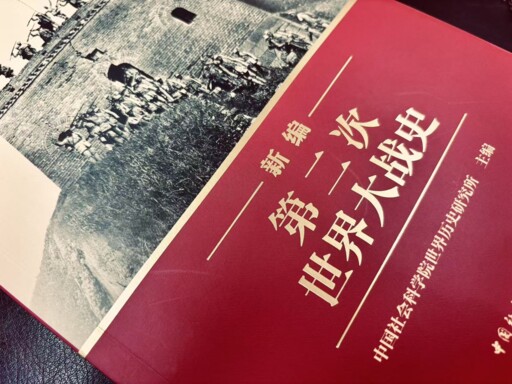


Chinese perspectives bring new shift to WWII research

A New History of World War II compiled by the Institute of World History at the Chinese Academy of Social Sciences Photo: Chen Mirong/CSST
To preserve the legacy of the victory of the World Anti-Fascist War, scholars around the world have worked to restore historical truth and uphold the principles of peace and justice. Yet regrettably, voices that deny or distort history continue to resurface. In recent years, incidents such as the dismantling of historical monuments, revisions of textbooks, and the deliberate obfuscation of major historical events have become increasingly common in certain countries. These developments indicate a troubling trend of historical revisionism within the international community—one that seeks to rewrite the collective memory of WWII and deny the justice and enduring significance of the World Anti-Fascist War.
Biases in international academia
For decades, dominant Western narratives have framed WWII through a Eurocentric lens, reducing it to a “great power rivalry.” Within this framework, China’s 14-year war of resistance against Japanese aggression (1931–45) has often been marginalized, misrepresented, or even omitted altogether. International reference works—including manuals, encyclopedias, and Wikipedia entries—largely perpetuate this outdated perspective, downplaying the contributions of the Eastern theater while deliberately overlooking critical historical data, such as the staggering scale of Chinese military and civilian casualties and in-depth studies of atrocities like the Nanjing Massacre.
Even more troubling is the ongoing denial of wartime atrocities by certain Japanese politicians and academics. Some continue to whitewash Japan’s aggression, glorify its colonial past, and distort the record of its war crimes. Whether in the form of narratives that exaggerate one nation’s role while downplaying others’, or outright denials of past atrocities and glorification of aggression, these flawed historical interpretations distort the truth and prevent a complete, objective understanding of WWII.
According to Zang Yunhu, a professor of history at Peking University, Japan has yet to fully confront and reflect upon its wartime aggression. This is evident not only in its denial of crimes such as the comfort women system and the Nanjing Massacre, but also, more critically, in its persistent dissemination of distorted historical narratives. Perspectives such as the “Greater East Asia War” theory, the “end-of-war” narrative, and the influential “Shiba Ryotaro” view all fall under the guise of pluralism, yet in reality they distort the truth, downplay or even glorify Japan’s aggression, and deflect accountability for wartime atrocities.
Regarding China’s 14-year war of resistance, perceptions in the international community remain varied. Meng Zhongjie, vice president of the Chinese Institute for History of the World War II and a professor from the Department of History at East China Normal University, observed a glaring lack of recognition for China’s contributions to WWII at the macro level. Most Western secondary school history textbooks provide no comprehensive account of China’s role—neither chronicling the events on the Chinese front nor assessing the significance of China’s efforts.
At the micro level, Meng added, misconceptions and biases persist. Some countries deliberately avoid mentioning the brutal atrocities committed by Japanese forces, such as the Nanjing Massacre and the immense suffering inflicted on Chinese civilians. This selective amnesia has even led many young Japanese to mistakenly view their country as a wartime victim rather than an aggressor.
New trends in WWII research
Thanks to the sustained efforts of Chinese scholars, the study of WWII in China has entered a period of flourishing productivity. Fresh perspectives and groundbreaking findings continue to emerge, gradually reshaping global understanding of China’s wartime contributions.
Shi Guifang, a professor from the School of History at Capital Normal University, asserted that these research achievements reflect more open and inclusive academic insights. By grounding their work in a commitment to peace and justice, Chinese historians have enhanced international recognition of China’s role in WWII. Their scholarly innovations and unique viewpoints have broadened and deepened the field of WWII studies internationally.During interviews with CSST, multiple experts highlighted the recently published A New History of World War II, compiled by the Institute of World History at the Chinese Academy of Social Sciences, as a landmark achievement. Yao Huina, secretary general of the Chinese Institute for History of the World War II, explained that this work, as a definitive Chinese-authored account of the war, comprehensively outlines the historical trajectory and pivotal moments of the global anti-fascist struggle. It not only synthesizes decades of domestic scholarship but also deepens the discourse with distinct Chinese characteristics and contemporary relevance.
Beyond this volume, Chinese WWII research has produced a wealth of outcomes on China’s role in the anti-fascist war and its participation in shaping the post-war order. Many of these works have been translated into English, Russian, and Japanese, garnering significant international attention. Meanwhile, younger scholars are pioneering interdisciplinary approaches—particularly in war memory studies—opening new frontiers for historical inquiry. Collectively, these developments underscore the irreplaceable value of Chinese perspectives, offering a more balanced and pluralistic framework for global WWII narratives. “These works not only restore historical truth but also correct the Eurocentric biases in Western scholarship, establishing a more accurate historical outlook,” Yao remarked.
As more research emerges, a paradigm shift is clearly underway in global WWII scholarship. Empirical studies on China’s humanitarian tragedies and national sacrifices—such as the Nanjing Massacre and other Japanese wartime atrocities—are gaining prominence. Liu Bensen, a professor from the School of Marxism at Shandong Normal University, attributed this shift to the rise of global history perspectives and China’s growing composite national strength. Yet more important factors, he believes, include China’s increasing archival openness, a surge in high-quality research, and expanding international collaboration—all of which have compelled the world to finally reckon with the Chinese theater’s monumental contributions.
Editor:Yu Hui
Copyright©2023 CSSN All Rights Reserved